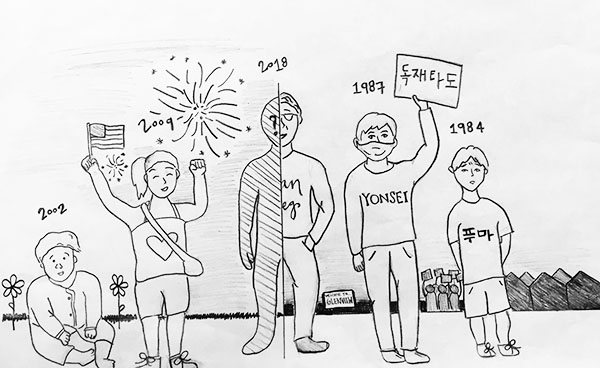Immigration impacts national identity, outlook

illustration by Yoon Kim
May 25, 2018
What factor determines one’s nationality? For most people, the answer is clear-cut and straightforward: it is simply the country that they are born in. On the other hand, there are people like me, and the definition gets a little more complicated.
I am one of the million undocumented children who have immigrated to the United States in hopes of having a brighter future; our parents traded their national identity, culture and friends for us to obtain more opportunities. Personally, ever since I came to the U.S. on July 1, 2009, I thought of myself as an American; not even a Korean-American, but just simply an American. Every Fourth of July, I would go all crazy with the red, white and blue, watching the fireworks at Gallery Park with my friends like a typical American teen. I know every word of the Pledge of Allegiance by heart, proudly saying it every morning while placing my right hand over my chest. I am more knowledgeable in the history of United States than the average U.S. citizen.
For the past eight years, I have been able to live a relatively comfortable life, indulging in the American Dream. This luxury was thrown out the window when my family got that letter from the immigration office.
Then, I finally realized that I was unwanted in a country that I had been proudly calling my home. Although I was mentally aware of what was going on, I could not comprehend the situation; I wanted to scream at the world, “THIS IS MY COUNTRY!”
“On April 17, 2017, [the immigration office] denied your Form I485.” I will never forget the day that I first read these words. At first, I could not really grasp the meaning; it was as if I was reading a Shakespearean play without SparkNotes.
As I began to comprehend the meaning of the letter, my hands started to shake uncontrollably as if the temperature had dropped about a hundred degrees. I could feel the paper getting heavier; it took me a while to realize that the water from my eyes was the perpetrator. Little did I know, I would get this notice two more times.
For weeks, this sentence continuously circled within my head, steadily eating me alive. At the climax of this frustration, my anger reached unparalleled levels. The rage washed over me like a tsunami.
I thought to myself, “How could these people be so brutal?” I was astonished that something so formal could be so excruciatingly painful. For me, this rejection would determine the course of my whole life, my identity.
I kept yelling, “WHY ME?” None of my friends had to give up their hopes or worry about getting kicked out their homes; their lives and futures were not dependent on a decision made by a stranger! A simple letter had triggered a whirlwind of emotion and catalyzed the obstacles that I would have to face in the near future. Despite all of the challenges, the hardest came in the form of just three words: who was I? Such a simple question, yet the answer seemed so complex.
Now, I was on a split road: leave the U.S. and give up my future or stay and be undocumented. My only hope was that I would have a lengthy chunk of time to combat this egregious error. I was wrong. Because I turned eighteen in March, I had to make a decision within 180 days. After countless sleepless nights, I made the hardest decision in my life: leave and finish my education in Canada.
I still do not know if I can get a Canadian visa or be able to continue my dream of becoming a doctor. I do not know if I can ever go to college. I do not know if I will be able to see my mom for the next ten years.
My life is full of uncertainties and challenges; however, I know that my future is worth more than relying on a marriage to guarantee my citizenship. I am more valuable than paperwork. I need to take this opportunity for a chance at my future, and I just need to keep trying.


